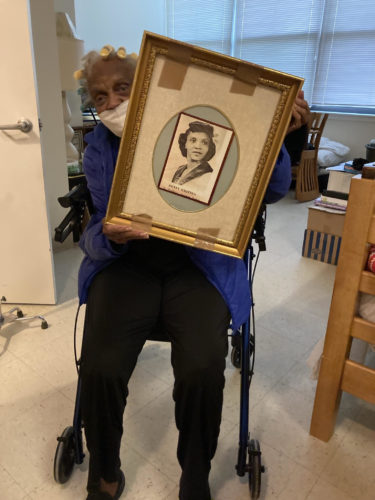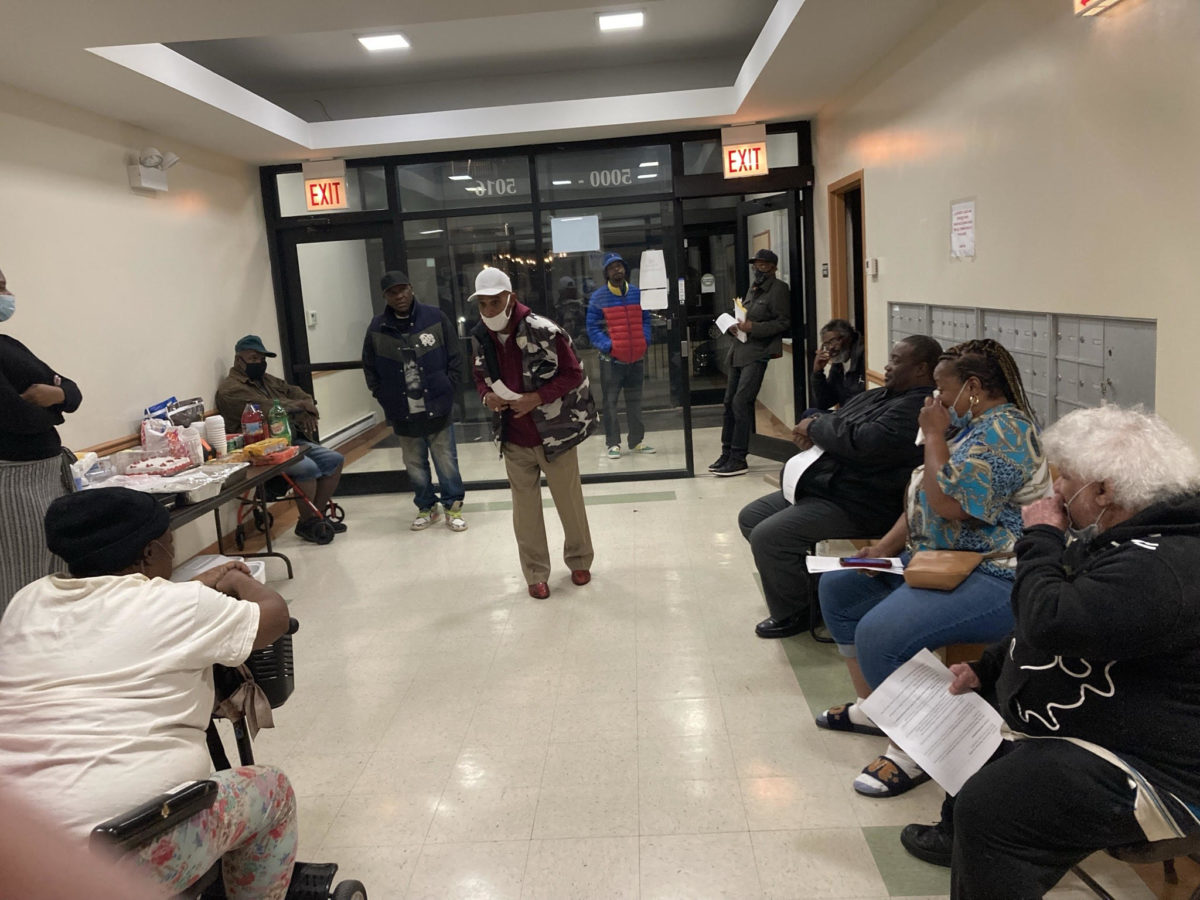Editor’s note: After this article was initially published, the Weekly clarified that the author is a former tenant of the property and helped organize the East Lake Tenants Union.
Formerly known as the Washington Park YMCA, the building located at 5000 South Indiana Avenue acted as a community anchor that provided fitness facilities, after-school programs, housing and resources to the residents of Washington Park and beyond. Many amenities came to an abrupt end in 2003 when the YMCA of Metropolitan Chicago announced the closing of the fifty-two-year-old YMCA due to the facility needing millions of dollars in repairs. In 2008, the re-imagined facility reopened its doors as the Washington Park SRO.
On a bitter-cold Saturday morning in late January, residents of the single-room-occupancy (SRO) building and supporters convened for a press conference to demand East Lake Management (ELM) follow the law—including housing City ordinances and building codes—improve living conditions, and recognize the East Lake Tenants Union (ELTU). [Editor’s note: The author of this article is a former resident of the East Lake SRO and helped organize the ELTU.] Residents testified about their experiences and called on tenants of East Lake Management properties citywide to join their call for better living conditions.
When it reopened, this sixty-three-unit building was, as stated by the Tribune, “a place to call home” meant to house formerly homeless and displaced public housing individuals. It had a vision of affordable, community-based living. In 2006, the City of Chicago invested $874,378 in low-income housing tax credits for East Lake Management, which was set to bring “$9.2 million in equity for the project,” the Sun-Times reported.
According to ninety-two-year-old resident Ms. Betty Jean, the amenities are “what really brought me over.”

Key to the Washington Park SRO redevelopment was a plan to incorporate mixed-use development that combined commercial and residential uses. A private gym would take up the fitness facilities once owned by the YMCA. Residents would be assured equal access, while advocates championed the positive social benefits of integrating low-income tenants with the mixed-income gym patrons.
So how did Washington Park SRO become the center of a tenants rights crisis? Noise became a nuisance. The crossfit gym has been a consistent source of complaints brought on by many tenants. According to residents, the building’s redevelopment never included sound insulation adequate for a residential property with a commercial gym, nor were the residents included in the plan. “Their dropping weights and all of that is just too much, it wakes you out of a sound sleep,” said Darren Bratcher, a tenant since 2013.
Long-term residents who have lived in the building since it reopened recall being given a brochure and tour of the facility that promised a gym and swimming pool for residents. Everything was centered around the gym, explained John Owens. Ever since, social programs originally included as part of the development have been picked off one by one. “There was a social worker, computer rooms were open, buses took you to the grocery store,” Owens reminisced.
Today, those amenities are only a memory. The promises were never kept and residents say the gym facilities have been intolerable, and noise is only the beginning. Despite receiving millions of federal dollars in subsidies, tenants say East Lake Management has neglected several City, state, and federal housing regulations and legal responsibilities to its residents: enforcing a “No guest” policy between 12:00am and 8:00am, barring tenants from having visitors overnight, and unlawfully placing certain visitors on a “ban” list, among others. Management also requires tenants to submit prior written approval to have an overnight guest.
Additionally, management requires front desk personnel to confiscate identification cards for guests to enter the building at any given time until they leave. These identification cards are in open view, spread out on the front desk clerk’s workspace with nothing to keep them from getting confiscated by others, according to tenants. Guests of residents have had their identification misplaced, lost, and taken home with employees. These practices are a violation of federal and state housing regulations.
East Lake Management did not respond to a request for comment as of press time.
ELM properties situated in other areas across the Chicagoland area provide their residents with front entrance keycards and an intercom buzz system. Tenants at 5000 S. Indiana do not have access to their building as other ELM properties do. In fact, they do not have open access to the front door and rear door entrances and exits of the building. Residents are required to wait for building staff to allow entry, which could pose a fire hazard.
Aside from the noise, tenant Mettle Fitness, LLC, which runs the gym on the property, does not comply with handicap parking laws and utilizes the residential tenant parking lot. Despite the business operating in a RM-4 Zone (a residential zone), Mettle Fitness routinely instructs its clients to park in the spaces that are designated for the elderly and disabled residential tenants when the business is open from 5:00am to 8:00pm Mondays through Saturdays. Tenants say the gym is also active beyond their hours of operation. “Outsiders that never lived in this building, they have more rights than we do,” said Owens.
Mettle Fitness did not respond to a request for comment as of press time.
Per residents, ELM refuses to supply information regarding full disclosure of all building code violations and the updates associated with them. For example, ELM was violating the Illinois peephole installation act by not installing view devices on residents’ doors. Shortly after being contacted by the Weekly, ELTU tweeted that ELM would install peep holes on Wednesday, May 4.
There are also no recycling services in the building, despite being touted in the redevelopment plans’ “go green” initiative in accordance with the City of Chicago recycling ordinance, and the trash piles up.
Washington Park tenants have found that ELM has continued to allow the security and condition of the building to break down while turning a deaf ear to complaints made by residents. In the process of documenting complaints and banding together, tenants have forged the East Lake Tenants Union (ELTU) whose presence has transformed the building. The tenant union is comprised of past and present East Lake tenants from various locations and hopes to improve the quality of life in all 172 East Lake-managed buildings
ELM has assured its tenants that these problems are a work in progress, but residents haven’t noticed changes being implemented. As one of the largest development companies in Chicago’s subsidized housing, East Lake receives millions of dollars in federal and City funding every year. Residents assert that the underlying cause of their problems isn’t mismanagement—it’s corporate greed. “There is no one here for us to voice our concerns and problems, they only want our rent,” Owens said.
Tenants are making their struggle public. The ELTU is calling upon the mayor, elected officials, the Chicago Housing Authority, the Illinois Housing Development Authority, the federal Department of Housing and Urban Development, and all East Lake tenants across the city to stand up to East Lake Management and hold them accountable for their negligence.
The mismanagement at 5000 S. Indiana is tied to the issues underlying the national housing shortage, the eviction wave, and the steady creep of gentrification—the crisis of tenants’ rights. Across the city and nation, tenants face worsening conditions, rising rents, mismanagement and harassment. These kinds of problems force renters out of gentrifying neighborhoods like Bronzeville. Few institutions exist to protect tenants or represent tenant interests, but the power of self-organized tenants exercised through collective action could grant them the right to control their living conditions.
Many residents have grown used to the bitterness of broken promises. According to tenants, local aldermen and City institutions have not been responsive either. For now, it seems, the tenants are on their own. Even without outside support, however, tenants have proven self-reliant and persistent, their resolve for justice only strengthening with time. Increasingly, residents view the tenants union—not management—as the only source of positive change.
“I’m bonding together with the tenants union and see if we can get something done,” Bratcher said.
ShowtimeShanna is an entrepreneur, housing organizer, and internet vlogger who produces original multimedia content. Follow @showtimeshanna on all platforms. This is her first contribution to the Weekly.


An unexpected turn for Washington Park SRO, I didn’t think that both the authorities and the management could be so negligent about the reconstruction, but these are, first of all, old people who need a decent standard of living
I am 55years old I am disabled homeless please help me I need a place to live.